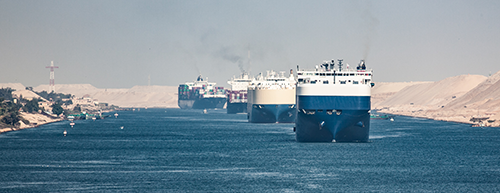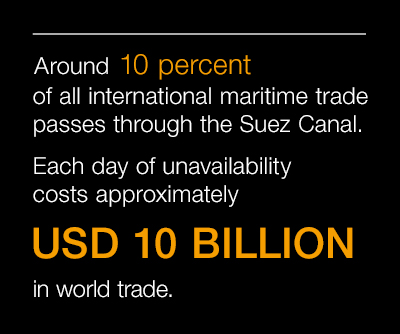Grounded Vessel Refloated and Underway
On March 23, 2021, the 200,000-ton container ship, MV EVER GIVEN, ran aground in the Suez Canal, reportedly amid high winds and poor visibility. The Taiwanese-operated vessel was underway from China to the Netherlands when she experienced difficulties and wedged diagonally across the canal's southern section, blocking traffic through one of the world's most critical waterways. Authorities immediately sought salvage vessels and excavation equipment to assist the stricken vessel, and although recovery efforts were initially slow, crews made significant progress through the night of March 28. She was eventually refloated and underway by the afternoon of March 29.
Limited Security Challenges to Backlog of Vessels
Approximately 400 vessels are waiting to resume passage in and around the canal due to the almost week-long blockage. Nonetheless, the security threat to stationary vessels in the area is low. Egypt's anti-terrorism efforts continue to curtail potential threats from the insurgency in the Sinai Peninsula and Islamic State-affiliated militant groups. The waterway is heavily protected and bolstered by the Bir Gifgafa Air Base in the Sinai. The last reported incident involving a vessel transiting the canal was in 2013; rocket-propelled grenades (RPGs) caused minimal damage to a container ship and no significant impact on canal operations. There had also been previous concerns over the possible use of advanced shore-based weapons or water-based explosive devices, though there remains no precedent for either in the region.
Canal officials estimate that they will clear vessel backlogs in three to four days. Operators planning to slow the passage of vessels moving north from the Indian Ocean due to the delays should be aware of security challenges in the southern Red Sea and the Gulf of Aden. Although piracy has declined, the threat to shipping in the area remains elevated due to spillover threats related to the conflict in Yemen. Al Houthi-aligned forces have previously threatened to impede maritime movement in response to coalition airstrikes and offensives. Nevertheless, the MV EVER GIVEN incident presents only a marginal increase in the latent threat.

Residual Impact on Supply Chains
The most significant impact of the blockage is likely to be the residual effect on global supply chains. The Suez Canal is the shortest and quickest route between Asia and Europe. Around 10 percent of all international maritime trade passes through the channel, and each day of unavailability costs approximately USD 10 billion in world trade. Even though traffic has resumed in the canal, lingering delays will probably affect a range of raw materials, petroleum products, and manufacturing parts to Europe, particularly in the southern regions, which rely heavily on the Suez trade. Disruptions due to the COVID-19 pandemic have also increased the cost of goods. A slight reduction in capacity on the Asia-Europe maritime route, higher freight rates, and port congestions are likely to persist in the coming weeks even as traffic through the canal normalizes.

Oil prices have remained relatively steady throughout the blockage; speculation around the vessel recovery duration inflated prices slightly. However, weak demand stemming from renewed COVID-19 lockdowns in Europe, the large global inventory of oil, and the SUMED pipeline – an oil pipeline running from the Gulf of Suez to the Mediterranean coast – tempered any significant increases.
Vulnerability of Global Trade at Chokepoints
While MV EVER GIVEN impeded traffic for less than a week, the incident highlights the vulnerability of global trade in naval chokepoints worldwide. Over 90 percent of trade is maritime-based, and significant portions of this transit through narrow waterways in strategic locations. Approximately 10 percent of trade goes through the Suez Canal, 40 percent of trade passes through the Straits of Malacca, and 20 percent of the world's oil flows through the Strait of Hormuz. The locations of some of these chokepoints present opportunities for transnational criminal groups, state-sponsored organizations, or even state actors to severely impact global trade and the economy. Operators should ensure they access the most up-to-date information and adhere to the recommended best management practices, such as reviewing security plans, hardening vessels, and reporting to relevant maritime security organizations to mitigate potential threats to their crews and assets when transiting through maritime chokepoints.


